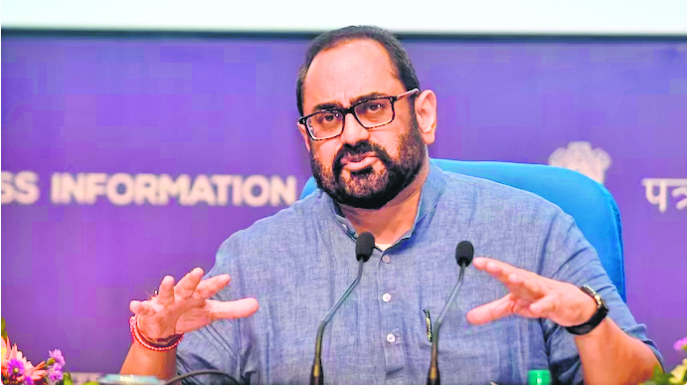
The Indian government is going to take a tough stance on the use of social media for malicious purposes, including the spread of deepfakes. In a recent statement, IT Minister Rajeev Chandrasekhar said that the government will assist citizens in filing FIRs against social media platforms that violate IT rules by publishing offensive content, such as deepfakes.
Chandrashekhar also said that the Ministry of Electronics and Information Technology (MeitY) will develop a platform where users can report violations of IT rules by social media platforms. He said that MeitY will help users to “very easily” report violations and file FIRs.
The minister’s statement comes after Prime Minister Narendra Modi expressed concern about the recent rise in deepfakes on social media. Chandrasekhar met with social media platform operators to discuss ways to prevent deepfakes.
Chandrashekhar said that there is already a law in India that prohibits the spread of fake content on social media. However, he said that most people do not know how to use the law effectively.
He also said that social media platforms will be given seven days to align their terms of service with IT rules. This month, a deepfake of actress Rashmika Mandanna went viral on social media, sparking outrage.
Minister of Electronics and Information Technology Ashwini Vaishnaw said a day before that the government will create rules for deepfakes, which are synthetic media that mimic authentic images, videos, and audio. He said that the rules will be designed to prevent the online spread of deepfakes, false and derogatory content.
Vaishnaw also met with representatives from social media and technology companies. He said that all companies agree that action is needed to address deepfakes.
IT Minister Rajeev Chandrashekhar said that India’s IT Act is 23 years old and that it is the responsibility of tech and social media companies to comply with it.
He also said that MeitY and the Indian government will designate a “seven rules officer” and expect 100% compliance from all platforms. In addition to child sexual abuse content, deepfakes will also be banned.
Chandrashekhar said that it is the “legal obligation” of social media companies to prevent the spread of fake news. If a complaint is received about a piece of content, it must be removed within 36 hours. In addition, such content must be banned.
Deepfakes can be used to spread misinformation and propaganda, and they can also be used to harm people’s reputations. The government’s actions will help to protect people from the harmful effects of deepfakes.
Some of the actions taken so far under IT Act
In February 2001, two men running a web-hosting company were arrested by Delhi Police. The company had closed a website due to non-payment of dues. The site owner claimed that he had already made the payment and complained to the police. Delhi Police charged these people with hacking under Section 66 of the IT Act and breach of trust under Section 408 of the Indian Penal Code. Both the men had to spend 6 days in Tihar jail awaiting bail.
In February 2017, a Delhi-based e-commerce portal filed a complaint with the Hauz Khas police station against some hackers from different cities alleging cyber crimes under the IT Act, including theft, fraud, misappropriation, criminal conspiracy, criminal breach of trust, and hacking. They also alleged spying and tampering with computer source documents and websites, and threatening employees. As a result, South Delhi Police arrested four hackers on charges of digital shoplifting.
In September 2012, freelance cartoonist Aseem Trivedi was arrested on charges of sedition under Section 66A of the IT Act, Section 2 of the Prevention of Insults to National Honor Act, 1971, and Section 124 of the Indian Penal Code. His cartoons depicting widespread corruption in India were considered offensive.
On April 12, 2012, Jadavpur University chemistry professor Ambikesh Mahapatra was arrested for sharing cartoons of West Bengal Chief Minister Mamata Banerjee and then Railway Minister Mukul Roy over email. The email was sent from a housing society email address. Subrata Sengupta, secretary of that housing society, was also arrested. He was charged under sections 66A and 66B of the IT Act, for defamation under section 500, for making obscene gestures to a woman under section 509, and for abetting an offence under section 114 of the Indian Penal Code.
On October 30, 2012, Puducherry businessman Ravi Srinivasan was arrested under section 66A. He had made a tweet accusing Karti Chidambaram, son of the then Finance Minister P. Chidambaram, of corruption. Karti Chidambaram had complained to the police.















